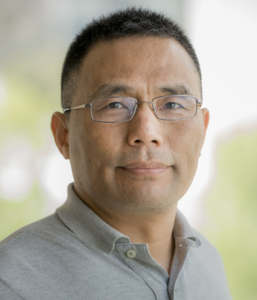
Qi-Long Ying (Photo by Chris Shinn)
Shanghai Cell Therapy Group (SHCell) recently entered into a six-year research collaborative project with Professor Qi-Long Ying from the University of Southern California (USC). Through the project, sponsored by $3.6 million from the Baize Plan Fund, the Ying laboratory aims to develop conditions for the long-term ex vivo expansion of mouse and human hematopoietic stem and progenitor cells.
“Hematopoietic stem cells, or HSCs, are found in the bone marrow of adults,” said Professor Qijun Qian, CEO of Shanghai Cell Therapy Group. “HSCs have the ability for long-term self-renewal and differentiation into various types of mature blood cells, and for rebuilding normal hematopoiesis and immune function in patients. They also have enormous potential to treat diseases, including tumors, autoimmune diseases, severe infectious disease, and inherited blood diseases, and to combat the effects of aging.”
This research project will be conducted and supervised by Professor Qi-Long Ying, a Professor of Stem Cell Biology and Regenerative Medicine at the Keck School of Medicine of USC. Professor Ying’s pioneering stem cell research has won international acclaim, including the 2016 McEwen Award for Innovation, the highest honor in the field.
“We’ll develop and optimize culture conditions for the long-term ex vivo expansion of HSCs,” said Ying. “We’ll also test combinations of basal media, small molecules, cytokines and growth factors, and characterize ex vivo expanded hematopoietic stem and progenitor cells. These cells will then be genetically modified and tested for their potential to treat different diseases, including blood disorders and cancers.”
Professor Andrew P. McMahon, Director of Eli and Edythe Broad Center for Regenerative Medicine and Stem Cell Research of USC, added: “Stem cell biology represents an exciting area in medicine with great therapeutic potential. I am delighted ShCell is supporting Professor Ying. A breakthrough in the ability to propagate and manipulate HSCs will have lasting clinical significance.”
The project also plans to build animal models of different blood diseases and cancers and test the safety and effectiveness of genetically modified hematopoietic stem and progenitor cells before clinical translation. SHCell will actively explore clinical applications of hematopoietic stem and progenitor cells in the treatment of cancers or blood diseases.
As SHCell’s first overseas collaboration, this project aims to advance the goals of the Baize Plan: to provide first-class cell treatments and cell therapies at an affordable price to cure cancer and increase life expectancy. SHCell hopes that this project will also accelerate original scientific breakthroughs in the stem cell field.